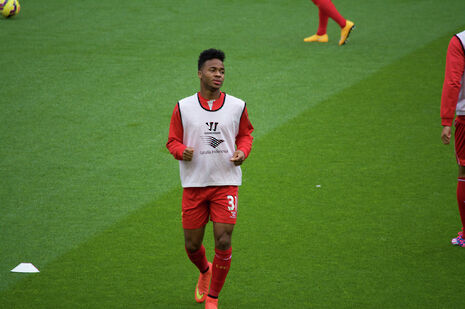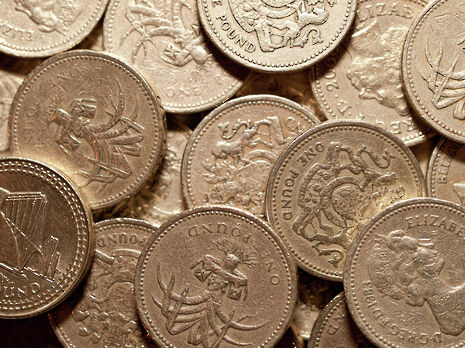Are Footballers Worth It?
James Dilley gives his two cents on footballers’ wages
“It's all about money, not freedom, y'all, okay? Nothing to do with fuckin' freedom.” So said Raheem Sterling to the board of Liverpool Football Club after deciding his £35,000 weekly salary just wouldn’t cut it anymore – nor would a new £100,000 a week deal offered to him last month.

Only kidding. These words were actually spoken by Bill Hicks, the legendary American stand-up comic and satirist. Substitute the word 'freedom' for 'football', however, and old Bill gives us a pretty good summary of the sport in 2015. Football, these days, is far from the working man’s game. The money involved is big, fickle and quite often dirty. Football, to many minds, is money.
There has been much fuss about the effect of capital on this globally popular sport. You have probably seen someone on your Facebook news feed suggesting, for example, that soldiers should be paid ‘footballers’ wages’. Questions of practicality aside, the complaint raises a fair point: does the service provided by top players really justify salaries that quickly reach into the millions?

It’s an emotive subject, and there is no right or wrong answer to the question. Value, despite its numerical representation in a market economy, is a subjective thing. For a Chelsea fan (apparently they do exist), Eden Hazard’s wage of nearly £200,000 a week may well be justified, since he helps the club win matches and trophies. Hazard offers footballing skills that few aside from the likes of Lionel Messi and Cristiano Ronaldo can lay claim to, with his efforts helping the club achieve glory and thus making the avid fan happy. As a result, the fan might accept his excessive salary as a fair reward for exceptional feats.
In more concrete terms, Hazard’s value is determined by the amount of revenue his actions can help bring to the club. This revenue is accrued in a number of different ways. For one there is club merchandise – football shirts, calendars, mugs, and so on. According to a set of figures provided by Sports Direct, Hazard accounted for 2.1% of all shirt sales for the 2014/15 season. That makes his shirt the fifth most popular in the Premier League amongst consumers, and given the huge mark-up that companies like Sports Direct give to these relatively cheap goods Chelsea make a good amount of money from the sales.
Evidence from elsewhere attests to the value of big-name signings in terms of shirt sales; a study by Euromericas Sports Marketing suggests that 345,000 James Rodriguez shirts were sold within 48 hours of the Colombian signing for Real Madrid. The financial reward to a club of signing a player whose reputation for good football precedes him can be great.

As we have already seen, a fan might personally value Eden Hazard highly for his contributions to the club, but this value can also be understood in real financial terms too. Winning the Premier League is like winning the lottery for a football club. Under the terms of the new TV deal between Sky and BT Sport for the 2016/17 season, the champion will receive £150 million in prize money, prior to considering the rewards from sponsors, shareholders and consumers. If Hazard plays well and helps the club to achieve this goal, then the few million spent on his salary will be money well spent.
One might think the numbers involved here are excessive, but that is neither here nor there. The powerful people that hold the cash believe football is worth a certain amount, and in real terms that is all that matters. If there was no market, there would be no money – but consumers can and will pay for Sky Sports deals, tickets, shirts, and whatever other football-related goods and services they can get their hands on.
Of course, none of this answers the question about whether or not a player like Eden Hazard should be paid that amount, regardless of the realities of the money involved. But to answer this question we move away from economics and into the realm of morality. Despite what some may say, the market is not moral. It does not care about 'rightness' or 'wrongness'. It cares about want and need; supply and demand; risk and reward. Say what you like about footballers’ wages, but until the people stop buying, the clubs will keep spending - and the players earning.
 News / Eight Cambridge researchers awarded €17m in ERC research grants27 December 2025
News / Eight Cambridge researchers awarded €17m in ERC research grants27 December 2025 News / News in Brief: carols, card games, and canine calamities28 December 2025
News / News in Brief: carols, card games, and canine calamities28 December 2025 News / Caius mourns its tree-mendous loss23 December 2025
News / Caius mourns its tree-mendous loss23 December 2025 Interviews / Meet Juan Michel, Cambridge’s multilingual musician29 December 2025
Interviews / Meet Juan Michel, Cambridge’s multilingual musician29 December 2025 Sport / Hard work, heartbreak and hope: international gymnast Maddie Marshall’s journey 29 December 2025
Sport / Hard work, heartbreak and hope: international gymnast Maddie Marshall’s journey 29 December 2025







